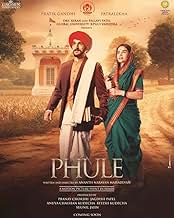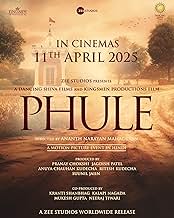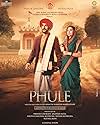Phule
- 2025
- 2 h 9 min
AVALIAÇÃO DA IMDb
8,1/10
2,6 mil
SUA AVALIAÇÃO
Adicionar um enredo no seu idiomaA husband and wife, it was the time of child marriage when girl child was refused education and pushed into marriage, he chose to educate his wife and were a social reformer they went to cam... Ler tudoA husband and wife, it was the time of child marriage when girl child was refused education and pushed into marriage, he chose to educate his wife and were a social reformer they went to campaign for increased rights for underprivileged.A husband and wife, it was the time of child marriage when girl child was refused education and pushed into marriage, he chose to educate his wife and were a social reformer they went to campaign for increased rights for underprivileged.
- Direção
- Roteiristas
- Artistas
- Direção
- Roteiristas
- Elenco e equipe completos
- Produção, bilheteria e muito mais no IMDbPro
Avaliações em destaque
This show courageously tackles some of the darkest realities of Indian society - the deep-rooted caste system, the discriminatory Varna system, and the oppressive ideology of Brahminism. It fearlessly pulls back the curtain on practices that have been normalized for centuries but are fundamentally unjust and inhumane. The show does not shy away from exposing how systems like untouchability and caste-based segregation have perpetuated inequality and suffering for generations.
What stands out most is how the series challenges the myth of "Hindu unity" - a notion often propagated in political and cultural spheres. By depicting the lived experiences of people from oppressed castes, the show reveals that the so-called unity is often a facade, papering over the brutal realities of social hierarchies and exclusion. The narrative makes it painfully clear that many marginalized communities have been historically excluded from the promises of equality and dignity, despite rhetoric claiming otherwise.
The depiction of Brahminism here is particularly bold and unflinching. It is not treated as a benign cultural tradition but shown for what it often becomes in practice: a tool for social control and discrimination. The show rightly distinguishes between faith and the exploitative structures built around it. It exposes how Brahminical supremacy has been maintained through myths, rituals, and systemic control over knowledge and resources. By doing so, it challenges viewers to rethink assumptions that have been passed down without question.
Another powerful aspect is how the show gives voice to the oppressed. Instead of romanticizing suffering or offering token representation, it lets the marginalized speak their truth. Their anger, their grief, and their resistance are given center stage. It's a breath of fresh air compared to the mainstream narratives that either ignore or sanitize these harsh realities.
In terms of storytelling, the series is hard-hitting and uncompromising. It does not dilute its message to appeal to broader audiences, nor does it resort to unnecessary melodrama. Instead, it presents a raw, honest portrayal that forces the viewer to confront uncomfortable truths. Every scene feels charged with purpose - to educate, to awaken, and to demand change.
This kind of work is rare in Indian media, where the mainstream often glorifies ancient systems without critical examination. The courage shown by the creators deserves immense appreciation. They have taken significant risks in choosing to expose the fraudulence and brutality inherent in Brahminism and the caste system. It is a bold act of truth-telling, and it will undoubtedly spark necessary conversations.
At the same time, it's important to recognize that the show is not an attack on individual faith or spirituality. It draws a clear line between personal belief and systemic oppression. The criticism is directed at the caste-based discrimination institutionalized through social and religious practices, not at any particular individual's right to their faith. This distinction is crucial and handled thoughtfully throughout the series.
In conclusion, this show is a must-watch for anyone who wants to understand the harsh realities of caste in India beyond sanitized textbooks and propaganda. It dares to say what needs to be said: that discrimination is woven deep into social structures, and true equality demands confronting these uncomfortable truths head-on. It is an eye-opener, a conversation starter, and a brave step toward dismantling age-old injustices.
Highly recommended for those who value truth, justice, and real social progress. Bravo to the creators for their fearless and much-needed work.
What stands out most is how the series challenges the myth of "Hindu unity" - a notion often propagated in political and cultural spheres. By depicting the lived experiences of people from oppressed castes, the show reveals that the so-called unity is often a facade, papering over the brutal realities of social hierarchies and exclusion. The narrative makes it painfully clear that many marginalized communities have been historically excluded from the promises of equality and dignity, despite rhetoric claiming otherwise.
The depiction of Brahminism here is particularly bold and unflinching. It is not treated as a benign cultural tradition but shown for what it often becomes in practice: a tool for social control and discrimination. The show rightly distinguishes between faith and the exploitative structures built around it. It exposes how Brahminical supremacy has been maintained through myths, rituals, and systemic control over knowledge and resources. By doing so, it challenges viewers to rethink assumptions that have been passed down without question.
Another powerful aspect is how the show gives voice to the oppressed. Instead of romanticizing suffering or offering token representation, it lets the marginalized speak their truth. Their anger, their grief, and their resistance are given center stage. It's a breath of fresh air compared to the mainstream narratives that either ignore or sanitize these harsh realities.
In terms of storytelling, the series is hard-hitting and uncompromising. It does not dilute its message to appeal to broader audiences, nor does it resort to unnecessary melodrama. Instead, it presents a raw, honest portrayal that forces the viewer to confront uncomfortable truths. Every scene feels charged with purpose - to educate, to awaken, and to demand change.
This kind of work is rare in Indian media, where the mainstream often glorifies ancient systems without critical examination. The courage shown by the creators deserves immense appreciation. They have taken significant risks in choosing to expose the fraudulence and brutality inherent in Brahminism and the caste system. It is a bold act of truth-telling, and it will undoubtedly spark necessary conversations.
At the same time, it's important to recognize that the show is not an attack on individual faith or spirituality. It draws a clear line between personal belief and systemic oppression. The criticism is directed at the caste-based discrimination institutionalized through social and religious practices, not at any particular individual's right to their faith. This distinction is crucial and handled thoughtfully throughout the series.
In conclusion, this show is a must-watch for anyone who wants to understand the harsh realities of caste in India beyond sanitized textbooks and propaganda. It dares to say what needs to be said: that discrimination is woven deep into social structures, and true equality demands confronting these uncomfortable truths head-on. It is an eye-opener, a conversation starter, and a brave step toward dismantling age-old injustices.
Highly recommended for those who value truth, justice, and real social progress. Bravo to the creators for their fearless and much-needed work.
Book My Show is doing injustice to the audience by not making the film made on Mahatma Phool available for booking. The film is well made but I am angry with the director because the changes he has made make it seem as if the whole context has changed. But still his effort to make this film is commendable. Thanks to the entire team of Phool for bringing Mahatma Phool on screen once again. Whatever changes were made in this film, it would not have hurt any Brahmin community, but it is not good to change the history of our Mahatma's message to please someone.
But many cinema halls did not show this, which clearly shows how much they are affected by the deeds of their ancestors.
But many cinema halls did not show this, which clearly shows how much they are affected by the deeds of their ancestors.
"Phule" is more than a film-it's a tribute to one of India's most revolutionary social reformers. Jyotirao Phule, along with Savitribai Phule, courageously challenged the deeply entrenched Brahmanical dominance in 19th-century India. At a time when caste oppression and patriarchy ruled every aspect of life, Phule fought for the rights of the oppressed, opened the first school for girls in 1848, and established the Satyashodhak Samaj to promote social equality. He fearlessly questioned the Manusmriti and other religious texts that justified untouchability and gender discrimination. Phule's intellectual fire and moral courage laid the foundation for social justice in modern India. This film does justice to his legacy by bringing his forgotten revolution back to public consciousness. A must-watch for anyone who values truth, equality, and courage."
Phule is a moving cinematic salute to the life and work of Jyotirao Phule, which is rich in historical detail yet full of emotional depth. The movie beautifully depicts his struggle as a reformer who battled social discrimination, and with outstanding performances by the cast that bring each character to life. The performance of the lead actor as Jyotirao is both poignant and inspiring, whereas the supporting cast, particularly the portrayal of Savitribai Phule, brings warmth and vigor to the story. Breathtaking visuals and a soulful soundtrack take audiences to 19th-century India, situating them in its struggle and glory. Universal themes of justice, perseverance, and equality make the film a relevant experience for audiences across generations. Must go with family and watch this movie.
Phule is not just a movie - it's an eye-opener. Every woman in India must watch this film to truly understand the harsh reality of where we come from, and what could have been if visionaries like Jyotirao and Savitribai Phule hadn't fought relentlessly for women's education.
The film sheds light on the brutal oppression faced by women, regardless of their caste - even Brahmin women - and how deeply entrenched the system was in denying them the basic right to education. Had Phule not challenged the orthodoxy and dared to fight against the system, the lives of Indian women today could have been drastically different - far worse and far more suppressed.
Phule serves as a stark reminder that rights like education, dignity, and equality were hard-won, not granted easily. It's a warning too - if women today do not stay vigilant and assert their rights, there is always the danger of slipping back into the same dark times, where, under the guise of religion and tradition, women's freedoms could again be curtailed.
The right to life, liberty, and education is not just for men - women must recognise this and fight to protect it. Watch Phule not just as a movie, but as a call to action.
The film sheds light on the brutal oppression faced by women, regardless of their caste - even Brahmin women - and how deeply entrenched the system was in denying them the basic right to education. Had Phule not challenged the orthodoxy and dared to fight against the system, the lives of Indian women today could have been drastically different - far worse and far more suppressed.
Phule serves as a stark reminder that rights like education, dignity, and equality were hard-won, not granted easily. It's a warning too - if women today do not stay vigilant and assert their rights, there is always the danger of slipping back into the same dark times, where, under the guise of religion and tradition, women's freedoms could again be curtailed.
The right to life, liberty, and education is not just for men - women must recognise this and fight to protect it. Watch Phule not just as a movie, but as a call to action.
Principais escolhas
Faça login para avaliar e ver a lista de recomendações personalizadas
- How long is Phule?Fornecido pela Alexa
Detalhes
Bilheteria
- Faturamento bruto mundial
- US$ 1.454
- Tempo de duração2 horas 9 minutos
- Cor
Contribua para esta página
Sugerir uma alteração ou adicionar conteúdo ausente

![Assistir a Trailer [OV]](https://m.media-amazon.com/images/M/MV5BMzdkNWRjMmEtN2Q2NC00MjM0LTljOTQtZGE5OTQ4YzMxYjk1XkEyXkFqcGdeQXRyYW5zY29kZS13b3JrZmxvdw@@._V1_QL75_UX500_CR0)
































